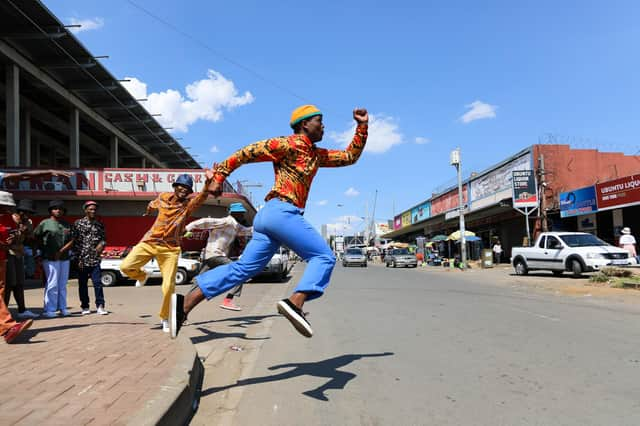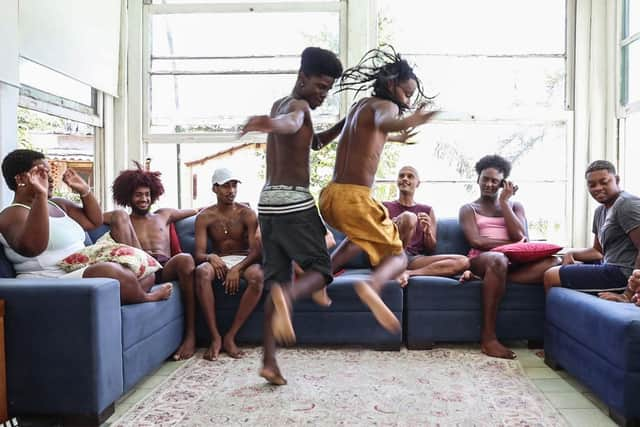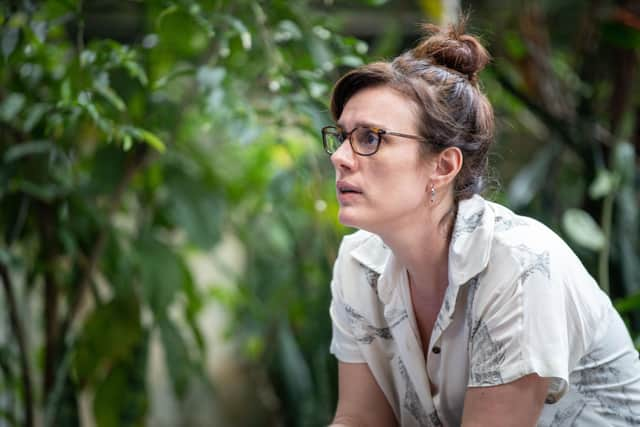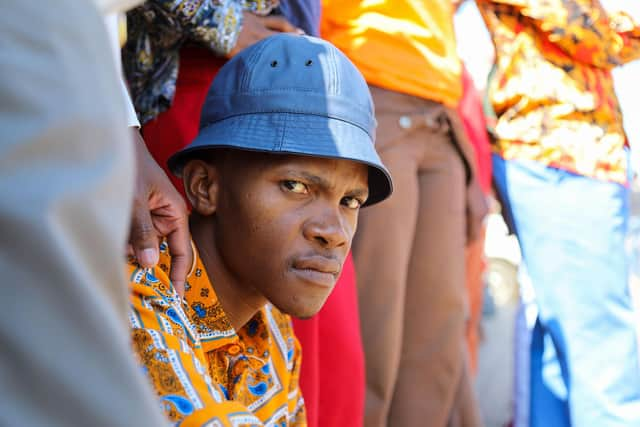Dancing in the Streets: How the EIF helped bring world dance stars to Edinburgh


You wouldn’t buy a house without seeing it first, possibly not even a pair of trousers. Yet without so much as a photograph to go on, festival directors often put their hands in their pockets and take a huge leap of faith by commissioning new works, sight unseen.
Such trust isn’t entirely unfounded. When the Edinburgh International Festival co-commissions or co-produces a new work, it does so alongside other respected partners – and the artists they take a punt on are usually a known quantity.
Advertisement
Hide Ad“Commissioning is much riskier than presenting an existing work that has already been premiered,” explains the festival’s programme director, Roy Luxford. “So when we commission an artist or company, or join as a co-commissioner, it’s generally borne out of a prior relationship in some form or other.”


Such is the case with Dancing in the Streets, an exciting quartet of films commissioned for this year’s Edinburgh International Festival dance programme. Each of the four choreographers involved – Alice Ripoll, Omar Rajeh, Gregory Maqoma and Janice Parker – have reputations that precede them.
Ordinarily, a commission starts with a period of research and development. Then, if the artist’s proposal looks promising, a commitment is made to a full production and rehearsals get underway. At that point, the festival steps quietly into the background.
“If the commission is pursued then it’s very much with the artists’ vision to create the finished work,” says Luxford. “And the commissioner is a voice in the work’s development, offering critical feedback, advice, and guidance as required.”
As with most things during the Covid-19 pandemic, Dancing in the Streets has worked slightly differently. Originally invited to perform live at the Edinburgh International Festival in 2020, Ripoll’s Rio de Janeiro-based company Suave was, like everyone else, forced to stay home. So, rather than deliver its existing work, Cria, the company was commissioned by the festival to make a film for August 2021.


Initially, Ripoll was hesitant – she had already made a film during lockdown whilst juggling home-schooling, and was not in a hurry to repeat the experience. Instead, she focussed on an upcoming European tour and hired a large house so that Suave could isolate together and rehearse.
Advertisement
Hide Ad“Then the tour was cancelled again,” recalls Ripoll. “But the dancers were already in the house, so I phoned the festival back and said ‘I can make a film here – we’re all back together after so long apart.’ But I had no script, no film crew, nothing prepared. I phoned a friend who is a filmmaker and said come here and we’ll think of something – so there was a lot of improvisation.”
With their tour cancelled and no need to rehearse, Ripoll and the dancers had free rein to just “be together, enjoy the house and invent things” – a far cry from their experience in recent months, living in Rio’s favelas. Already known for its stark contrast between rich and poor, the pandemic only exacerbated the situation in the Brazilian city.
Advertisement
Hide Ad“It’s been a complete mess,” says Ripoll. “People lost their jobs and those who were poor before became super-poor. When you leave your house in Rio, you don’t walk more than 100 metres without someone asking you for money to buy food. We had that before, but not in this proportion.


“Things in Brazil are already more difficult for artists than they are in Europe – especially the dancers that you see in this film, who live in the favelas in Rio where there are not many opportunities.”
Brought together in 2014 for an education project that was only due to last a few weeks, Suave proved so popular with tour bookers and producers that the company has been running ever since. When dancing together on Zoom during lockdown proved unsatisfactory, they stopped meeting. So to be back together in the rented house was special for everyone. Dancing mainly Passinho – a dance style born in the favelas that translates as "little step” – the performers responded to the space around them and to each other.
“What I chose to show in the film is very much related to the way they live and the way they talk,” says Ripoll. “It’s a different way of dancing from somebody who went to a dance school. These people have danced since they were born, it’s for fun, it’s something they do while they’re cooking, while they’re talking. And I always try to bring that to the stage – that’s the kind of material generated by this group. So it was interesting to film them because the movement comes from everyday life.”
After commissioning Ripoll to make the film, the festival stayed in touch but had every confidence that Suave could come up with the goods.
“They were very supportive,” she says. “They didn’t ask for any kind of restrictions, they didn’t know anything about what I would do. They just said film it and see what happens – it’s a way for you to still participate in the festival this year.”
Advertisement
Hide AdUnlike Ripoll, South African choreographer Gregory Maqoma wasn’t due to be part of the festival in 2020. However, commissioning him for Dancing in the Streets was a great way to bring in an artist the festival team had been interested in for some time. Born in Soweto, Maqoma is known for his blend of traditional and contemporary movement, as well as tackling complex social situations through his work. He too found the Edinburgh International Festival to be a supportive, but largely silent, creative partner.
“To be commissioned to make a film still allows me to have my voice heard in the UK,” says Maqoma, “and to make work that can resonate with my country and my vision. So it was great to have that kind of relationship with the festival – to have conversations that plant a seed, but then be left to get on with it. And I think that’s phenomenal, that there’s no control in terms of what the film should be or what you bring. When they believe in an artist, they go full force to support them.”
Advertisement
Hide AdMaqoma’s film, Retrace-Retract, is set in the heart of Soweto, and features the poetry of fellow South African Jefferson Tshabalala.
“I first saw Jefferson about seven years ago, when he was doing a spoken word performance,” recalls Maqoma. “And I found it quite fascinating in terms of his use of the South African lingo and his social messages around poverty and the instabilities in our politics. He asks the same questions that I do about the role of democracy – what does it really mean, to me but most importantly what does it mean to young people?”
According to Maqoma, in the 27 years since the end of apartheid in South Africa, only the infrastructure and architecture has changed. “We’ve given the country a facelift but we’re not changing the lives of people,” he says. “The economic differences are still there, poverty still looms in the air – you see it, you feel it.”
Much of the movement we see in the film is Pantsula, an energetic dance style that originated in the South African townships. It’s one of the many creative solutions ordinary people have found to counteract the societal, political and economic situations they find themselves in.
“They’ve taken all that negativity and transformed it into a positive energy,” says Maqoma. “It’s their way of speaking truth, using music and dance as their methodology. So the crux of the film was a chance for me to retrace and go back to where I was born, to the dusty streets of Soweto and see how much has changed. But also to be influenced by new impulses, by new developments in the cultural landscape.”
Maqoma and the dancers spent time filming in the squatter camps of Kliptown, a suburb of Soweto where Covid has hit hard. As with all his work, he wanted to capture the good and bad, the highs and lows.
Advertisement
Hide Ad“The film is a cocktail that doesn’t get you intoxicated but does take you on an emotional journey,” says Maqoma. “It’s like driving through Soweto – on one street corner you’ll see someone dancing, on another there’s a dead body that’s just been shot and is covered in newspapers, a minute later you see a child begging for food – it’s a rollercoaster of emotions. That’s the kind of work I make, because that’s what I know.”
For Maqoma, being part of the Edinburgh International Festival isn’t just an opportunity for his work to be seen on the world stage, but also for him to share another side to his homeland, rarely shown on mainstream media.
Advertisement
Hide Ad“What’s important for me, is that this is a window into South Africa,” he says. “Because you see reports from CNN and other channels and in most cases they only talk about the bad things. Then I look at myself, born and bred in Soweto where my parents still live, where this film was shot and most of the artists who are in it live – and I wanted to show that in amongst the bad they have made phenomenal strides. That is what Retrace-Retract is about.”
The Dancing in the Streets films are screening at Dance Base, Edinburgh, on 20 & 21 August, and are also available to stream from home, see www.eif.co.uk
A message from the Editor:
Thank you for reading this article. We're more reliant on your support than ever as the shift in consumer habits brought about by coronavirus impacts our advertisers.
If you haven't already, please consider supporting our trusted, fact-checked journalism by taking out a digital subscription at https://www.scotsman.com/subscriptions